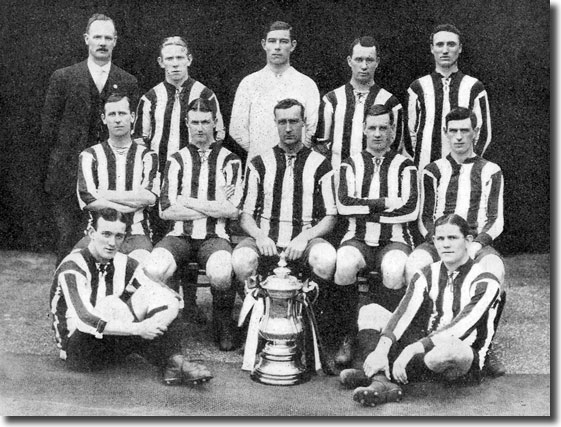 |
 |
 |
 |
 |
 |
 |
 |
 |
 |
 |
Players
Harry Gough (goalkeeper) 1918
Chesterfield has a rich tradition as a source of fine goalkeeping talent;
Harry Gough, the youngest of eight children, is one of the earliest
examples, though he most of his football was played in Yorkshire. After spending his formative years with Spital Olympic and Castleford
Town, Gough played three games in the Second Division with Bradford
Park Avenue in 1910, before returning to Castleford, where he gave some
notable performances for the club. Sheffield United of Division One offered him a chance of top flight
football in 1913, and Gough seized the opportunity with both hands,
going on make 242 League appearances for the club over the course of
the following decade. He won the FA Cup with United in 1915 when the
Blades beat Chelsea 3-0 in the 'Khaki Cup final' at Old Trafford. During the First World War, Gough had a brief period with Leeds City.
His association with the club had long been mooted. In December 1915,
the Leeds City programme reported: 'The City management, during the week,
have had application from a goalkeeper of first class repute for a game
with the City. I have heard it whispered that he kept a great goal on
the occasion of the last English Cup final, and was mainly instrumental
in the Cup once more finding a resting place in Yorkshire. "Who said
Gough?" To which may be queried, why should Sheffield United demur
- indeed, have they any real right to object at all? Castleford Town would
miss Gough the most. He works in Fryston Colliery, and can play with Leeds
City much more conveniently than Sheffield.' Such a move, however, would have left the Blades without a recognised
keeper, and the rumours came to nothing at that time. Gough continued
to play for Sheffield when he was not on duty with the Royal Navy, giving
fine performances over the next couple of years against City, increasing
their interest in him. 1918 finally saw Gough in Leeds colours; he played on Christmas Day
and Boxing Day against Huddersfield Town. He had earlier guested for
Hibs in Scotland. Gough continued to shine with Sheffield United after the resumption of
peacetime football, though his Blades career ended in controversy. In
the summer of 1924, the 33-year-old began preparations for his retirement
by buying the Railway Hotel in Castleford. The premises were licensed,
provoking a furious response from Sheffield and FA chairman, Charles Clegg,
a teetotaller, who ordered him to get rid of the property. Gough claimed
to have 'acted in ignorance' and offered to repay the wages he had received
over the summer, but steadfastly refused to give up the hotel. The United board were equally resolute and in September, Gough was
suspended by the FA, and a month later saw his FA registration cancelled.
He was left in limbo, with Sheffield United demanding a fee of £2,400
from any potential buyers. Gough's appeal to the Football League for
a reduction was rejected and he was told he could not even re-register
as an amateur to play for local clubs, though he spent some time with
Castleford and Harrogate Town. The fee was clearly exorbitant for a player of his age and it effectively
put his career on hold, as United refused to compromise on a price which
deterred any interest. The club relented after a year and when Oldham
put in a bid of £500, Gough was sold in October 1926, two years after
the cancellation of his contract. His final game for United was a 2-0
County Cup Final victory over The Wednesday. In 1927, Gough moved on to Bolton Wanderers, for whom he played four
league games, before joining Torquay United in 1928 where he continued
to play until 1930. Dislodging Archie Bayes, he missed just three games
in his first season. He played seventeen times the following year, losing
his place to Bayes, before announcing his retirement. Gough won a single cap for England, against Scotland at Hampden Park
on 9 April 1921. He had an unhappy day between the posts with England
beaten 3-0. Described as 'cool, collected and very tough', Gough was renowned for
his bravery and daring between the posts. He had a leg amputated in 1963 and died on 16 June 1970.  Born:
Newbold, Chesterfield, 31 December 1890
Born:
Newbold, Chesterfield, 31 December 1890